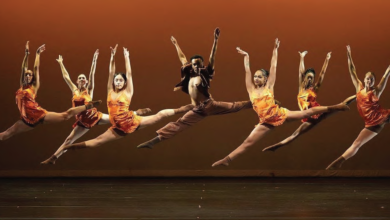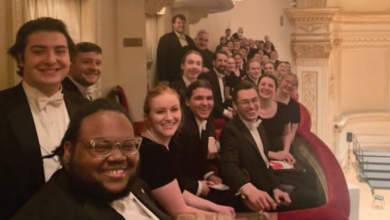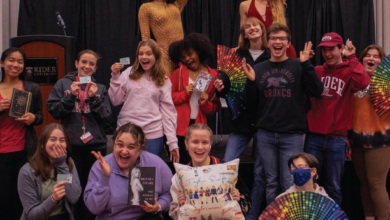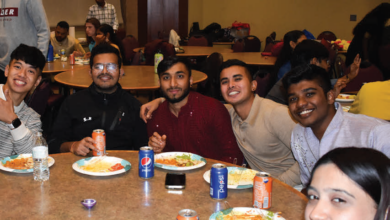
Westminster Choir College students face many struggles caused by COVID-19
By Ruhan Ye
The pandemic has dealt an overwhelming blow to the academics of Westminster Choir College (WCC) students. Unlike other subjects, music students needed to rely on the piano room and rehearsal hall for training and practicing. Although all courses have been transferred online, it was still far from the effect of in-person education, according to first-year piano pedagogy graduate student Jinyan Lin.
For those students who rely on pianos and other musical instruments, having complete equipment and venues was essential. At the same time, music was a subject that needed to be filled with emotion, which required a close connection between professors and students. Online education could merely achieve basic theoretical knowledge, which led WCC students to struggle in their academics.
Lin, who studies and performs at WCC, thought Zoom learning lost the practice and chorus parts of learning. Each student needed to take a chorus class and there were 98 people in Lin’s chorus class. If Wi-Fi connection was poor, it would be extremely inconvenient for the online chorus. Lin said, “In the previous chorus through Zoom, the chorus assistant controlled the audio. Students with good timbre would be amplified, while students with poor timbre due to poor Wi-Fi conditions would be muted.” This undoubtedly brought about unequal chorus training for students, she said.
Beyond that, the professors were also challenged. Those students who were muted during the chorus were still watched by the professor. At that moment, Lin pointed out, “The professor would focus on the mouth shape of each student on Zoom and imagine their voice at that time.”
To have an equal opportunity for each student, the chorus was uploaded by recording as a video. The professor listened to each student’s video and gave a score. This was a relatively complete way for each student to be trained, Lin explained.
Another drawback, however, was the lack of an audience. Lin stated, “It was incomplete for the chorus without audiences. We adjusted our emotions based on the reaction of the audience.”
Cassandra Sutter, a sophomore piano major, commented that music was kind of touching, people need to be in music. The pandemic seemed to impair the resources and conditions of many music students, Sutter said.
As for the practice, it was another opportunity to build a connection with the professor. “In the piano performance, the professor would guide the piano performance skills and correct the problems of playing for each student. However, in-person classes might not achieve [that] now,” Lin said.
Similarly, Sutter said, “The professor and we could not be in the classroom, so we were individuals learning. It was like a process of self-discovery and navigating.”
Since last fall, when WCC moved to the Rider campus, which also brought a series of problems for academic resources to students. Lin said, “Compared with the Princeton campus, the Rider campus provides us with limited academic equipment and resources.” The Rider campus was a brand-new environment that the choir students needed to adapt to.
Lin described the confusion she experienced with academic resources and equipment at the Rider campus, saying, “There are very few piano rooms for us to use and the timbre of some pianos is inaccurate, which affects our performance score.” Lin also added, “Most piano rooms with good timbre would be locked on Fridays and weekends, which gave me a headache. When you could play very well but could not get the desired result due to external factors, it was a huge psychological contrast.”
Limited resources greatly hindered students’ academic achievements. Simultaneously, Lin claimed that, at times, “professors were also troubled, the professor did not want to affect the student’s score, the only thing he could do is adjust it from the pitch.”
Additionally, other resources were scarce at Rider’s campus, such as the rehearsal hall. Lin said, “There was not a rehearsal room large enough for 98 people. If we could have in-person classes in the spring, we still would not be able to find a suitable place. Perhaps we might have lessons on the lawn, but the lack of a fine sound control environment would affect our chorus.”
Compared with the Princeton campus, the Lawrenceville campus has a larger area and more buildings, but still could not provide Westminster Choir College students with good equipment and venues.
Sutter said, “Rider campus had many resources but we don’t know much about the Rider campus, especially during the pandemic, we lost communication with this new campus.”
However, Lin said there were benefits to WCC moving to the Lawrenceville campus.
“Many students lived on campus and we could find partners,” Lin said. “The partners could give suggestions to each other for their piano performance.” This has brought benefits to their academics.
For classes during the pandemic, Lin and Sutter hoped to get support from academic resources.
“Open the piano room as much as possible, because, for those piano majors, practice was the most first significant task. I also hoped that our choir could get the audience to render the atmosphere for us, even if it was not possible in the short term,” Lin said.
Sutter said, “The in-person class was not a great idea, but I hope to keep communicating with the professor.”
The pandemic is still ongoing, but WCC students have gradually adapted after struggling with getting used to their new campus.



